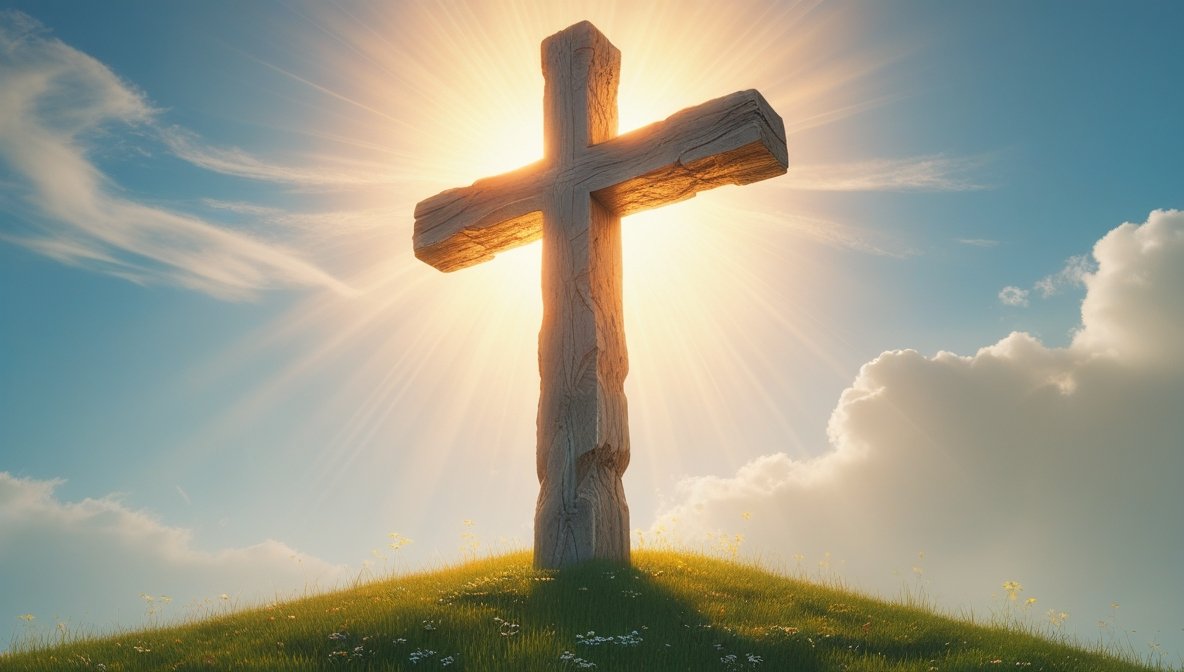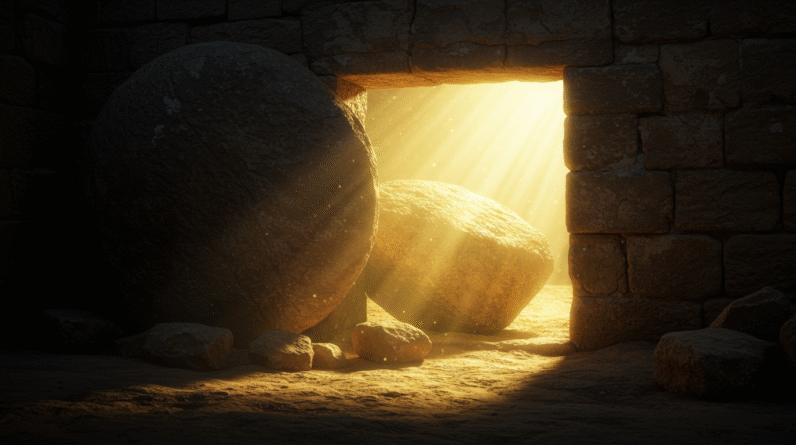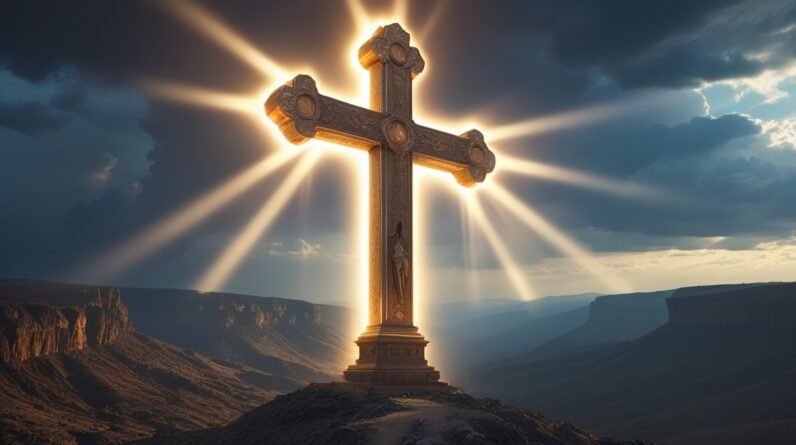Why Jesus Died: The Meaning Behind His Sacrifice
When you ask the question “Why did Jesus die?” you are standing at the doorway of the most important truth the world has ever known. This is not just history or theology; it’s personal. The death of Jesus touches your life, your conscience, your longings, and your fears. In clear, loving language, the Bible explains that Jesus’ death was not a meaningless tragedy but the very act by which God reached down to restore the broken relationship between you and Him. As you read, you’ll see the Bible’s explanation that Jesus died in your place—substitutionary atonement—so you could be reconciled to God and live in the freedom and hope He offers.
The Problem of Sin
To understand why Jesus died, you must first understand the problem He came to solve: sin. Sin is not merely bad behavior or a list of mistakes; it is rebellion against a holy and loving God. Because God is perfectly holy, He cannot simply overlook sin. That fact drives the biblical storyline and explains why a remedy was necessary. The Scriptures teach that sin is universal and separates you from God, creating a barrier that you cannot remove by your own efforts.
What Is Sin?
Sin is missing the mark of God’s good standard. The apostle Paul tells us plainly, “for all have sinned and fall short of the glory of God” (Romans 3:23). That means every person—yourself included—has come short. Sin affects your thoughts, your actions, your motives, and the way you relate to others and to God. It’s a condition of the heart and a reality that explains why the world groans with pain, injustice, and death.
The Consequence of Sin: Death
Because sin injures the relationship between you and God, it carries a consequence. The Bible states the case plainly: “For the wages of sin is death” (Romans 6:23). Death here is more than the end of physical life; it includes spiritual separation from God—the loss for which no human remedy is sufficient. In other words, you cannot fix the problem simply by trying harder, being a better person, or doing more good deeds. The scale is not balanced by your efforts.
God’s Holiness and Justice
When you ask why Jesus died, you must consider who God is. God is holy—set apart, perfectly pure. His holiness demands that sin not be ignored. At the same time, God is love, and His love drives Him to act to redeem humanity. These attributes—holiness and love—are not in conflict in the cross; they meet perfectly there. God’s justice demands a response to sin, and His love provided that response in the person of Jesus Christ.
God’s Holy Majesty
Scripture pictures God’s holiness in vivid language: “Holy, holy, holy is the Lord Almighty; the whole earth is full of his glory” (Isaiah 6:3). That holiness means God cannot ignore evil or simply pretend sin doesn’t matter. His moral nature requires that wrong be addressed. Yet you must never imagine that His holiness removes His compassion; rather, holiness and compassion meet at the cross.
Justice and Mercy United
How does God remain just while also being merciful? The Bible answers that God provided a way to satisfy both. In His wisdom, He offered a sacrifice that dealt fully with sin’s penalty while extending mercy to sinners who trust in Him. Paul explains that God presented Christ “as a sacrifice of atonement, through faith in his blood” to demonstrate His righteousness and justice (Romans 3:25-26. In this way, justice is honored and mercy is offered—both are realized in the cross.
Substitutionary Atonement Explained
At the heart of the Christian answer to “Why Jesus died” is the doctrine of substitutionary atonement. This means Jesus took the place of sinners, bearing the penalty we deserved so we could receive the righteousness we do not deserve. This idea is rooted deeply in both Old and New Testament teachings, where sacrificial systems pointed forward to the one perfect sacrifice that would remove sin forever.
The Old Testament Foreshadowing
Long before Jesus’ death, God taught Israel through sacrificial laws that life belonged to God and that sin required a sacrifice: “For the life of a creature is in the blood” (Leviticus 17:11). Those sacrifices were never an end in themselves; they pointed to a greater, final sacrifice. The prophets looked forward to a servant who would suffer for the sins of many, and Isaiah describes this servant in words that closely match the New Testament’s portrayal of Christ: “But he was pierced for our transgressions, he was crushed for our iniquities” (Isaiah 53:5. These passages set the stage for the explanation of why Jesus died.
Christ Took Our Place
The New Testament declares that Jesus, though sinless, died in the place of sinners. Paul writes that God made Christ “who had no sin to be sin for us, so that in him we might become the righteousness of God” (2 Corinthians 5:21). In other words, Jesus exchanged Himself for you. He accepted the penalty you deserved so that you might receive the pardon you could never earn. That is the heart of substitutionary atonement: Jesus died in your place.

Jesus Died in Our Place
When you consider why Jesus died, remember this central truth: He died in your place. That is not a theological abstraction but a personal reality. Jesus laid down His life for you because He loves you. He stepped into the role that sin required to free you from its grip.
The Good Shepherd and the King Who Serves
Jesus described Himself as the Good Shepherd who lays down His life for the sheep, demonstrating that His death was voluntary and sacrificial on behalf of others (John 10:11). Likewise, He explained that He came “to give his life as a ransom for many” (Matthew 20:28. The New Testament writers reiterate that He bore our sins in His body on the cross so that we might die to sin and live for righteousness (1 Peter 2:24. These verses show that Jesus did not die for Himself but for you.
The Cross as Demonstration of God’s Love
If you ask “Why Jesus died,” you should hear the answer echoing God’s love for you. The cross is the clearest possible demonstration of that love. When love meets justice, it looks like a Savior who is willing to bear the penalty that justice requires so that sinners might be forgiven. The cross tells you that God’s love is not sentimental; it is sacrificial.
God Loved You Enough to Send His Son
The most famous verse in Scripture gives you a clear, tender answer: “For God so loved the world that he gave his one and only Son, that whoever believes in him shall not perish but have eternal life” (John 3:16. This is not an abstract doctrine; it is a personal invitation. God values you so highly that He sent Jesus to die in your stead. And the apostle Paul adds that God demonstrates His love for you in that while you were still a sinner, Christ died for you (Romans 5:8.
Love and Justice United
The cross is where love and justice meet. God’s love does not cancel justice; it fulfills it. The Scriptures assure you that God’s purpose in Christ was to demonstrate both His love and His righteousness, reconciling you to Himself through Jesus’ sacrifice (Romans 3:26. In other words, when you look at the cross, you see a God who refuses to ignore sin and yet refuses to abandon sinners.
The Resurrection: Power Over Death
Understanding why Jesus died is incomplete without also recognizing why He rose again. The cross deals with sin’s penalty; the resurrection deals with sin’s power. If Jesus had only died, you would have a martyr and a noble example. But because He rose from the dead, you have a living Savior who can transform your life now and guarantee your future.
The Centrality of the Resurrection
The apostles preached a message centered on Christ’s death and resurrection because both are essential: “Christ died for our sins… he was buried… he was raised on the third day according to the Scriptures” (1 Corinthians 15:3-4. The resurrection proves that God accepted Jesus’ sacrifice and that death no longer has the final word. It shows you that Jesus’ victory over the grave is your assurance of eternal life.
New Life Begins Now
Because Jesus rose, you are offered newness of life today. Baptism symbolizes being united with Christ in His death and raised with Him to walk in newness of life (Romans 6:4. The resurrection is not merely something you will experience after death; it is the power at work in your life now to free you from the dominion of sin and to enable you to live for God.
How You Respond: Repentance and Faith
Knowing why Jesus died is not enough if you do not respond. The Bible calls you to repentance and faith—turning from sin and trusting in Jesus’ finished work on the cross. This response is simple to describe but radical in its implications for your life. It moves you from being an enemy of God to being a child of God.
Repentance: Turning From Sin
Repentance is more than feeling sorry; it is a deliberate turning away from sin and turning toward God. Peter urged his hearers to “repent and turn to God, so that your sins may be wiped out” (Acts 3:19. When you repent, you acknowledge your guilt, abandon reliance on your own righteousness, and receive God’s forgiveness through Christ. Repentance opens the door for the new life God offers.
Faith: Trusting in Jesus’ Sacrifice
Faith means trusting in the person and work of Jesus Christ. The Bible makes clear that you are saved by grace through faith, not by works, so that no one can boast (Ephesians 2:8-9. To trust Jesus is to rely on His substitutionary death and resurrection as the sole ground of your forgiveness. If you confess with your mouth that Jesus is Lord and believe in your heart that God raised Him from the dead, you will be saved (Romans 10:9. That confession is a life-changing commitment rooted in the reality of why Jesus died.
The Ongoing Work of the Cross in Your Life
When you understand why Jesus died and you respond in faith, the work of the cross continues in your everyday life. The cross not only secures your forgiveness; it reshapes your identity, your relationships, and your purpose. You are set free to live a life that reflects God’s character and advances His kingdom.
Freedom from Condemnation
One immediate blessing of Christ’s sacrifice is freedom from condemnation. Paul declares that there is now “no condemnation for those who are in Christ Jesus” (Romans 8:1. Because of Jesus’ death and resurrection, you are no longer judged based on sin; your standing before God is secured by Christ. This truth should fill you with gratitude and motivate holy living.
Growth into Christlikeness
The cross begins a healed relationship with God that leads to lifelong transformation. You are called to live in the freedom Christ won, resisting the patterns of sin and growing in love, joy, peace, patience, and all the fruit of the Spirit. The apostle Paul invites you to stand firm in the freedom Christ provides and not to submit again to a yoke of slavery (Galatians 5:1. The cross empowers you to become more like Jesus in character and action.
The Church’s Role: Proclaiming the Cross
Knowing why Jesus died should move you to a life of mission. The church exists to proclaim the message of the cross—the good news that Jesus died for sinners and rose again. As you belong to Christ, you become part of that witness, bringing the hope of reconciliation to a world that desperately needs it.
Proclaiming the Gospel to All Nations
Before He ascended, Jesus gave His followers a commission: “Therefore go and make disciples of all nations” (Matthew 28:19. The message you carry is centered on the cross and resurrection—the reason why Jesus died and rose again so that whoever believes in Him will have eternal life. The church is called to be a light in the world, inviting others to experience the same grace that transformed you.
The Cross Shapes Community
The cross not only saves individuals but forms a new community marked by love, humility, and service. The apostle Paul reminds the world that the message of the cross is powerful to those who are being saved (1 Corinthians 1:18. As you live in a Christian community, you are shaped by the cross to love sacrificially, forgive readily, and serve humbly—the very marks of Jesus’ own life.
Common Questions and Objections
When you explore why Jesus died, honest questions and objections will arise. People wonder, “If God is loving, why require blood? Couldn’t He have just forgiven?” The Bible answers these questions by showing that the cross both upholds God’s justice and displays His mercy. The sacrificial system of the Old Testament teaches that death was the means by which sin’s penalty was paid, and the New Testament shows that Christ fulfilled that requirement once for all.
Why the Need for Blood?
The language of blood in Scripture underscores the seriousness of sin and the cost required to deal with it. Hebrews explains that “without the shedding of blood there is no forgiveness” (Hebrews 9:22. This does not mean God is bloodthirsty; it means that sin’s debt is real and cannot be ignored. The cross reveals a God who does not cover sin lightly but who pays the price Himself to reconcile sinners.
Couldn’t God Just Forgive?
On the surface, that seems reasonable. But if God simply forgave without addressing sin’s consequences, that would undercut His moral order and leave justice unfulfilled. The cross shows that God’s forgiveness is not cheap; it is costly. He met the demands of justice in the person of His Son so that sinners could be forgiven without God compromising His righteousness. That is the profound mystery of grace: God bore what you deserved so you could receive what you did not deserve.
The Eternal Significance: Reconciliation and Restoration
When you grasp why Jesus died, you see that His death has eternal implications. It makes possible reconciliation with God, restoration of creation, and a certain hope of a new heaven and new earth. The cross is not just an event in history; it is the hinge of God’s plan to make all things new.
Reconciliation with God
The apostle Paul writes that God has given us the ministry of reconciliation: “God was reconciling the world to himself in Christ, not counting people’s sins against them” (2 Corinthians 5:18-19. Through Jesus’ death, the breach between you and God is healed. You are offered peace with God and the privilege of walking in an intimate relationship with Him—something humanity lost in the Garden but regains through the cross.
The Promise of Restoration
Scripture points beyond individual forgiveness to the final restoration of all things. Revelation pictures a time when God will dwell with His people, wipe away every tear, and remove death, mourning, and pain forever (Revelation 21:3-4. The cross is the beginning of that restoration, the opening act in God’s work to set creation right. Because Jesus died and rose again, you have hope that God’s redemption will extend to every corner of reality.
Living in Light of the Cross
Understanding why Jesus died should change how you live. The cross calls you to gratitude, worship, obedience, and evangelism. It frees you from pride and despair, redirects your priorities, and gives you hope that transcends circumstances. Living in light of the cross is not a burden; it is the most joyful and satisfying way to live.
Gratitude and Worship
When you truly grasp the cost of your salvation, worship becomes the natural response. The psalmist calls us to respond to God’s mercy with praise and thanksgiving. Your life becomes a living sacrifice, offered in gratitude for the One who gave Himself for you. Worship is not confined to a church service; it is the posture of a heart that knows why Jesus died and responds with love.
Obedience and Service
The cross compels you to a life of obedience and service. Jesus said that anyone who loves Him will keep His commands, and His teachings shape how you love God and neighbor. The cross is not merely an abstract doctrine to assent to; it is the power that transforms your actions. Because Christ died in your place, you are called to live for Him, serving others and advancing His kingdom.
Conclusion: Why Jesus Died for You
So why Jesus died—ultimately—is to bring you back to God. He died in your place, bearing the penalty of sin, satisfying justice, and revealing the depth of God’s love. He rose again to give you new life now and the promise of eternity with Him. Your response is to repent, to trust in Christ’s finished work, and to live each day in the light of the cross. If you have never placed your trust in Jesus, today is the day to do so. If you already follow Him, rejoice and renew your commitment to proclaim the good news to those who still need to hear why Jesus died.
Explore More
For further reading and encouragement, check out these posts:
👉 7 Bible Verses About Faith in Hard Times
👉 Job’s Faith: What We Can Learn From His Trials
👉 How To Trust God When Everything Falls Apart
👉 Why God Allows Suffering – A Biblical Perspective
👉 Faith Over Fear: How To Stand Strong In Uncertain Seasons
👉 How To Encourage Someone Struggling With Their Faith
👉 5 Prayers for Strength When You’re Feeling Weak

📘 Jesus and the Woman Caught in Adultery – Grace and Mercy Over Judgement
A powerful retelling of John 8:1-11. This book brings to life the depth of forgiveness, mercy, and God’s unwavering love.
👉 Check it now on Amazon
As a ClickBank & Amazon Affiliate, I earn from qualifying purchases.
Acknowledgment: All Bible verses referenced in this article were accessed via Bible Gateway (or Bible Hub).
“Want to explore more? Check out our latest post on Why Jesus? and discover the life-changing truth of the Gospel!”






